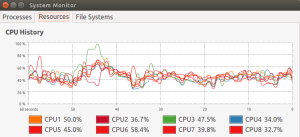

- #Ffmpeg library video frame rate mp4
- #Ffmpeg library video frame rate software
- #Ffmpeg library video frame rate code
I saw the vsync option, i use it with different values as output and input options, but it seems to have no effect. I use this command line to encode: ffmpeg.exe -f rawvideo -vsync 1 -pix_fmt rgba -s 1172x768 -i -threads 0 -y -pix_fmt yuv420p -b:v 8000K -vf vflip output.mp4Īnd i write in to my stream with: uchar* buffer = (uchar*)malloc(count) įwrite(buffer, sizeof(char), count, m_ffmpeg)

To clarify, if i am not updating my application for 1 sec, this halt won't appear in the final video. Now i want to send those raw rgba pixels value to ffmpeg, I use this wonderfull link to encode my input stream, but in the end i have a video where each frame has been concatenate with a constant time between each. A new frame is drawned when only some changes appear in the scene, so no constant frameRate. This was extremely useful to learn what the library expects from you as the user.I have a Qt application running, i hijack the openGL frameBuffer when a new frame has been rendered. Above all the useful functions, they have descriptions about what fields may be set, and which must be set for it to work.

#Ffmpeg library video frame rate code
Never hard code the scaling AVRational, always re read it from the AVCodecContext as the libav internals can clamp the value.Īs to "why" you have to set these fields, I'd recommend reading the header Doxygen of avcodec.h and avformat.h. If original framerate is 24 FPS, 2 FPS is a 12x reduction in the amount of frames. for spacing every 5 metres at average speed of 8.33 m/s ffmpeg - r value (fps) 8.3 / 5 ffmpeg - r value (fps) 2 You can already see the frame savings over the raw video. That's also what I used for my application with VFR (receiving video over UDP) and it worked well.ĭon't forget use the version of your code with av_rescale() when setting the pts value of the frame, and after initialising AVCodecContext, you have to set time_base on that too. ffmpeg -r value (fps) ave speed (m/s) / frame spacing (metres) e.g.
#Ffmpeg library video frame rate software
I'm not sure why but a lot of video software (including FFmpeg client) seems to choose 1/12800 as the time_base for MP4.

If sometimes you can have a smaller or larger time in between frames (variable framerate), increase your time_base. You are telling the muxer that your frames are produced in increments of 1/FPS, like 1/25, and in no case smaller than that. It looks like you are doing mostly correct things, but your time_base is too small for your purpose. How should I manipulate dts and pts so that I can achieve a video at certain frame that does not have all the frames as specified in the stream initialization? Where should I do that manipulation? On get_video_frame? On write_frame? On both?Īm I heading in the right direction? What am I missing? fprintf(stderr, "Error while writing output packet: %s\n", av_err2str(ret)) Ret = av_interleaved_write_frame(fmt_ctx, &pkt) * Write the compressed frame to the media file. If (ret = AVERROR(EAGAIN) || ret = AVERROR_EOF) int write_frame(AVFormatContext *fmt_ctx, AVCodecContext *c, AVStream *st, AVFrame *frame) When I rescale pts the program crashes complaining that pts is lower then dts.įrom what I've been reading, the pts/dts manipulation is supposed to be done at the packet level so I have also tried to manipulate things on write_frame routine without success. What I'm trying to do is to pass a timestamp in ms since the beggining of the recording so that I can rescale the pts. On the original code, the pts is simply an incremeting integer for each frame. When I initialize the video stream context I declare that frame rate is FPS: AVRational r =, ost->st->time_base) On my program, frames are supposed to be generated at FPS, however, depending on the hardware capacity it might produce less than FPS. ffprobe -showentries framepicttype,pktptstime. When I inspect the presentation timestamp using.
The problem with the example is that isn't a real world scenario as frames are being generated on a while loop for a given stream duration, never missing a frame. I was running ffmpeg on Ubuntu 16.04 with the following command to make sure that the video has a constant frame rate of 60 fps: ffmpeg -i in.MP4 -vf -y -vcodec libx264 -preset medium -r 60 -mapmetadata 0:g -strict -2 out.MP4 &1.I'm using ffmpeg-libav and I'm basing myself on the muxing.c example.
#Ffmpeg library video frame rate mp4
I’m muxing the generated video frames stream in a video file (x264 codec on a mp4 container). I have a process that generates video frames in real time.



 0 kommentar(er)
0 kommentar(er)
